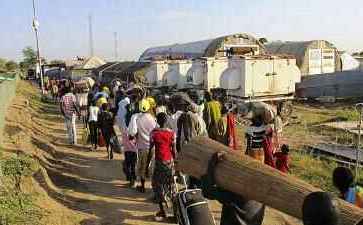UN confirms relocation of displaced Nuers to new site in Bor
October 18, 14 (BOR) – At least 1,100 internally displaced people (IDPs) of Lou Nuer ethnic origin, who have been living at the UN camp in Jonglei state capital Bor, have been relocated to a new site.

So far around 1,100 IDPs of the estimated 2,700 living among peacekeepers at UN camp have been moved.
During the crisis, around 17,000 people sought protection at the UN camp, although that figure dropped when many people left for Juba, Lakes state and other areas.
Jonglei recorded the highest number of displaced people across South Sudan’s 10 states at the height of the crisis, with 618, 800 people fleeing their homes.
However, since August Bor has witnessed a huge influx of returnees from neighbouring Uganda and other parts of South Sudan.
Humanitarian worker John Madding, who had been engaged in distributing relief food distribution, confirmed the increase in new arrivals.
“What we do to prove that the people are new arrivals is the ration, card which they were given in those camps they sought protection in Uganda or elsewhere,” he said.
“If the card, plus some supporting documents would qualify the person as a new arrival, [then] we register such families and give them food when general food distribution comes,” he added.
OCHA has also reported a significant increase in the number of returnees since September.
Over 12,254 people were registered in August and September, according to data from South Sudan’s Relief and Rehabilitation Commission (SSRRC).
(ST)
